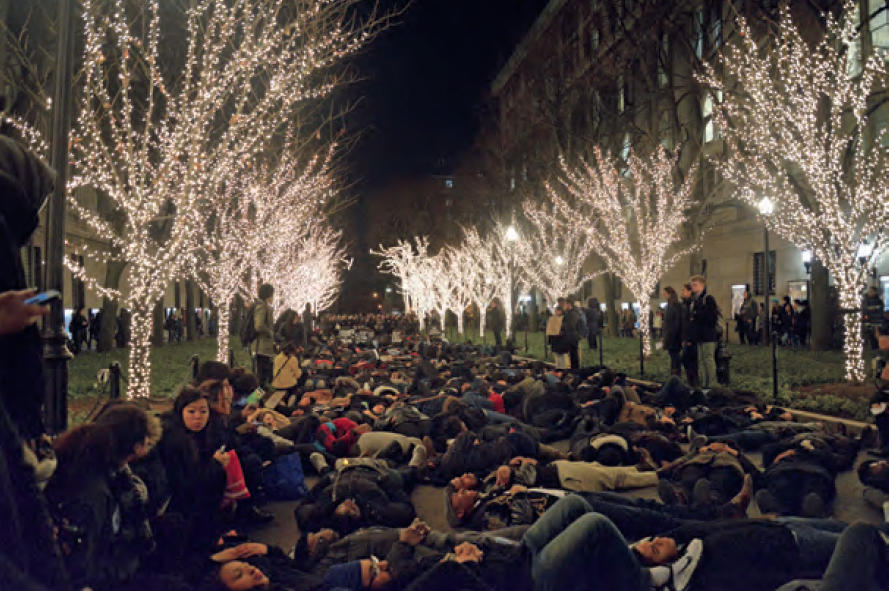More than two hundred students of color lay down on College Walk on the evening of December 4, 2014, in a peaceful demonstration during Columbia’s annual tree-lighting ceremony. A day earlier, a grand jury in Staten Island had declined to indict a white police officer whose chokehold led to the death of an unarmed African- American man, Eric Garner.
Organizers of the protest asked students to dress in black and asked that white allies refrain from participating in the “die-in” because “your bodies are not targeted by the system in the ways Blk&Brown bodies are,” according to the “official Die-In Mission Statement” obtained by Bwog, Columbia’s student-run news website.
Across campus, students reacted with strong emotions, both to the Garner verdict and to a recent grand-jury decision in Ferguson, Missouri, in which another white police officer had not been indicted for killing an unarmed black man. In a letter to faculty and administrators that was posted online, a group called the Columbia Law School Coalition of Concerned Students of Color wrote, “We have been traumatized over and again by the devaluation of Black and Brown lives. We are falling apart . . . We have struggled to compartmentalize our trauma as we sit and make fruitless attempts to focus on exam preparation.” The coalition requested that deeply affected students be allowed to postpone their exams. The law school, in a move that prompted lively public debate, honored the request.
“The grand juries’ determinations to return non-indictments in the Michael Brown and Eric Garner cases have shaken the faith of some in the integrity of the grand-jury system and in the law more generally,” wrote interim dean Robert E. Scott. “For some law students, particularly, though not only, students of color, this chain of events is all the more profound as it threatens to undermine a sense that the law is a fundamental pillar of society designed to protect fairness, due process, and equality.”
On Wednesday, December 11, students at the Mailman School of Public Health held a forum to talk about the Garner case and racism in general. “For a moment, imagine holding your breath, wanting to breathe but not allowing yourself to, and then finally exhaling,” wrote Mailman student Brittany Brathwaite on the Columbia Public Health: Student Voices website, describing the feelings of release afforded by the forum. “I, and so many other students of color, allowed ourselves to stop suffocating in our truths. Wednesday, I felt held by the institution I chose to attend. We created a space where people could voice their trauma and pain, have it listened to and affirmed.” Another Mailman student, Cheyanda Onuoha, wrote, “Before the forum, I felt a sense of isolation at Mailman as a black body; seeing so many of my peers courageously go deep within themselves and speak the truths I’ve been feeling related to race, racism, and social injustices, not only brought about a new level of connectedness but started the process of healing.”



